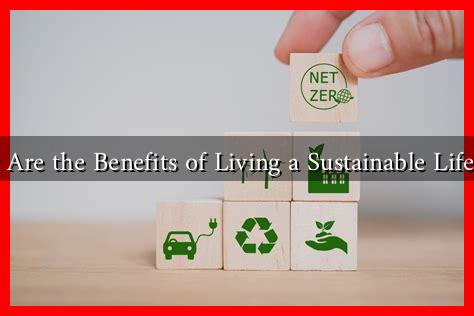-
Table of Contents
What Are the Benefits of Living a Sustainable Lifestyle?
In recent years, the concept of sustainability has gained significant traction as individuals and communities recognize the urgent need to address environmental challenges. Living a sustainable lifestyle not only benefits the planet but also enhances personal well-being and fosters a sense of community. This article explores the multifaceted advantages of adopting sustainable practices in daily life.
Environmental Benefits
One of the most compelling reasons to embrace a sustainable lifestyle is its positive impact on the environment. By making conscious choices, individuals can contribute to the preservation of natural resources and the reduction of pollution. Here are some key environmental benefits:
- Reduction of Carbon Footprint: Sustainable living encourages the use of renewable energy sources, such as solar and wind power, which significantly lower greenhouse gas emissions.
- Conservation of Resources: Practices like recycling, composting, and reducing waste help conserve valuable resources and minimize landfill contributions.
- Biodiversity Preservation: Sustainable agriculture and responsible consumption protect ecosystems and promote biodiversity, ensuring that future generations can enjoy a rich variety of flora and fauna.
According to a report by the Global Footprint Network, if everyone lived like the average American, we would need 5 Earths to sustain our current lifestyle. By adopting sustainable practices, we can help reduce this demand on our planet.
Health Benefits
Living sustainably often leads to healthier lifestyle choices. Here are some health benefits associated with sustainable living:
- Improved Nutrition: A sustainable diet emphasizes local, organic, and seasonal foods, which are often fresher and more nutritious than processed alternatives.
- Physical Activity: Sustainable transportation methods, such as biking or walking, promote physical activity, reducing the risk of chronic diseases.
- Mental Well-being: Engaging with nature and participating in community gardening or local clean-up events can enhance mental health and foster a sense of belonging.
A study published in the journal Environmental Health Perspectives found that individuals who live in greener environments report better mental health and lower levels of stress.
Economic Advantages
Adopting a sustainable lifestyle can also lead to significant economic benefits. Here are some ways in which sustainability can save money:
- Lower Utility Bills: Implementing energy-efficient practices, such as using LED lighting and energy-efficient appliances, can reduce electricity costs.
- Reduced Waste: By minimizing consumption and reusing items, individuals can save money on unnecessary purchases.
- Support for Local Economies: Purchasing from local farmers and businesses keeps money within the community and supports local job creation.
According to the U.S. Department of Energy, energy-efficient homes can save homeowners an average of $500 per year on energy bills.
Social and Community Benefits
Living sustainably fosters a sense of community and social responsibility. Here are some social benefits:
- Community Engagement: Sustainable initiatives often involve community participation, strengthening social ties and fostering collaboration.
- Education and Awareness: Sustainable living encourages individuals to educate themselves and others about environmental issues, promoting a culture of awareness and responsibility.
- Intergenerational Equity: By prioritizing sustainability, we ensure that future generations inherit a healthier planet, fostering a sense of stewardship.
For example, community-supported agriculture (CSA) programs connect local farmers with consumers, creating a direct relationship that benefits both parties and strengthens community bonds.
Conclusion
Living a sustainable lifestyle offers a myriad of benefits that extend beyond environmental conservation. From improved health and economic savings to enhanced community engagement, the advantages are compelling and far-reaching. As individuals, we have the power to make choices that not only benefit ourselves but also contribute to a healthier planet and society. By embracing sustainability, we can create a brighter future for ourselves and generations to come.
For more information on sustainable living practices, visit EPA Sustainability.


